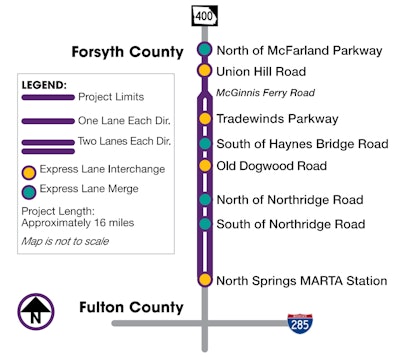
Starting in 2031, drivers will be able to pay to use new express lanes along a stretch of SR 400 near Atlanta.
On August 15, the Georgia DOT approved the apparent best value proposer – SR 400 Peach Partners LLC – for the project, which will add new express lanes in both directions along a 16-mile section from McGinnis Ferry Road in Fulton County and McFarland Parkway in Forsyth County. By paying the new lanes’ variable-priced tolls – meaning prices will adjust with traffic levels – drivers will be able to bypass congestion.
Construction is scheduled to begin next year on the $4.6 billion project and be completed in 2031.
Additionally, a bus rapid transit system will be added to the project corridor, giving transit providers access to the new express lanes at several points.
Funded through a public-private partnership, the contractor will make a concession payment of $4.05 billion to the state; design, build, finance and operate the project; and collect all generated toll revenue. SR 400 Peach Partners estimated a total construction cost of $4.6 billion.
Members of the SR 400 Peach Partners group include ACS Infrastructure, Meridiam, Acciona Concesiones, Acciona Construction, Dragados and Parsons.
Dragados and Acciona Construction formed a joint venture to carry out the project’s design and construction, and a dedicated project company will be created to oversee long-term operations and maintenance on the contract over the next 55 years.
This group has previously developed similar projects including SH-288 in Houston, I-66 Outside the Beltway in Northern Virginia, and North Tarrant Expressway in Dallas.
A press release from SR 400 Peach Partners also said, “An innovative proprietary solution from team member Indra USA, based on advanced radar technology and traffic predictive modeling, will provide a higher level of safety, reliability and service during operations.”
“SR 400 has been an integral part of the region's transportation network for over five decades,” said Jannine Miller, executive director of the State Road and Tollway Authority and the Atlanta-region Transit Link Authority, and GDOT’s director of planning. “As the state’s economy and population have grown, so too has traffic in this critical part of the region. This challenge can only be solved with innovative mobility options to keep Georgians moving. We’re excited that Peach Pass customers and transit riders will have a new option to experience a high-tech, reliable trip in one of metro Atlanta’s most congested highways.”










